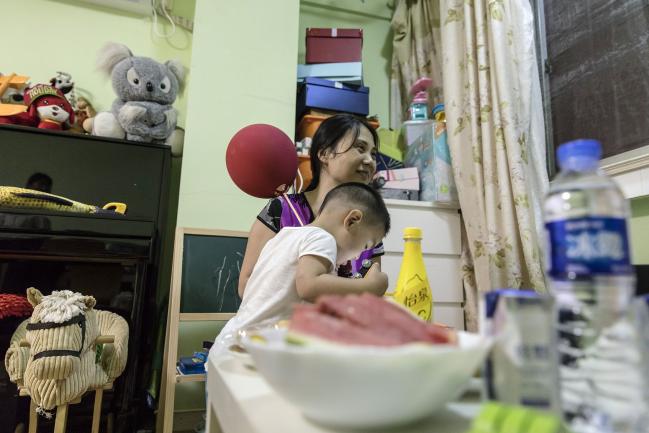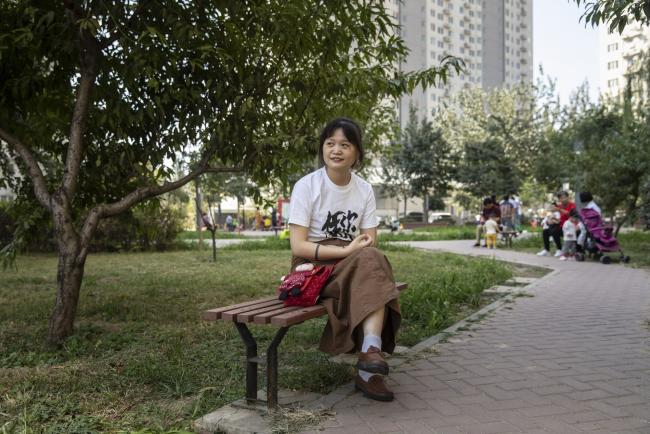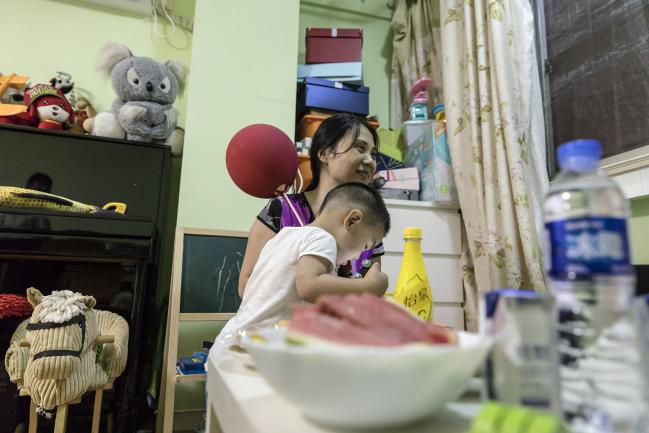(Bloomberg) -- Sign up for Next China, a weekly email on where the nation stands now and where it's going next.
For generations, a Chinese woman who gave birth out of wedlock was shunned by society and discriminated against by authorities. Now, as the Communist Party seeks to boost a slowing birthrate, that is starting to change.
Yue Li, based in the southern port city of Guangzhou, thought she would face a range of obstacles in getting her son legal documents after she gave birth last year following a separation from her ex-boyfriend. But she was surprised how easy it was to access maternity benefits and obtain a residential permit known as a hukou for her son-- so much so that she posted a step-by-step guide for others in a WeChat account for non-conventional families.
Even though authorities finally scrapped the one-child policy in 2016, along with rules requiring a marriage certificate for hukous, implementation has been mixed across China’s 31 provinces. In Guangdong, where Yue lives, provincial authorities have removed fines that were levied against unwed mothers for flouting the nation’s “family planning” laws.
“To be honest, the looser policies really gave me a lot more courage to have the baby,” Yue wrote in the WeChat account named Diverse Family Network, which advocates reproductive rights and has more than 2,000 followers. “It would not have been possible a year earlier. The penalties would have cost tens of thousands of yuan!”
Zhan Yingying, who runs the WeChat account, said more than 100 unwed mothers from a dozen of China’s most developed cities told her they hadn’t been harassed by the authorities over fines or encountered problems getting hukous for their children.
“We do see signs of easing restrictions in places,” Zhan said by phone, adding that more women are speaking out and pushing for change. “If they don’t tell the stories, they will always be ignored.”
Changing Attitudes
The societal shift is underway as the Communist Party gets desperate for newborns. The number of babies born in the country dropped to the lowest level in almost 60 years in 2018, signaling the looser two-child policy has done little to reverse its slowing birthrate, and worsening the outlook for growth in the world’s second-largest economy.
After taking power in 1949, the Communist Party codified centuries of culture that placed the traditional nuclear family at the center of society into so-called “family planning” laws, leaving little room to accommodate single parents or same-sex relationships. While no law in China directly penalizes women for having children outside of marriage, for a long time almost every aspect of her child’s life -- including during pregnancy -- was made harder without a father named on official paperwork.
There is no official data on single mothers in China. A state-run Shanghai media outlet called The Paper estimated that more than 1 million people have been born out of wedlock in China, based on the 2010 census and a study conducted by local academics in 2014.
Attitudes toward single parents are changing in China, as they are in the rest of the world. In a survey released in 2016 of about 2,800 Chinese by three NGOs including the Rainbow Lawyers Network, more than 86% of respondents said it was acceptable for a single woman to have a child, and 75% said it was acceptable for lesbian couples to have children.
He Yafu, a Guangdong-based demographer, said moves to give back reproductive rights to individuals would have “little impact” on the overall fertility rate as financial pressures, high housing prices and the demands of work often discourage both single and married women from having children. But, he said, the moves are “still significant as it means a departure from decades of family planning policies.”
Losing Battle
Although things are getting better, many women still struggle against ingrained biases in many parts of China. Zou Xiaoqi has been locked in a two-year court battle with the Shanghai Social Insurance Fund Management Center as it refused to reimburse her for medical expenses after having a child because she couldn’t produce a document that required a marriage certificate.
“You won’t find explicit discriminatory policies in official documents against unwed mothers but in reality they are everywhere,” said Zou, the mother of a two-year-old son. “Unwed mothers’ reproductive rights aren’t explicitly denied in the country’s national law, but once you get on the ground and start to claim your benefits, it’s just impossible.”
In China, employers pay into a government fund that covers its female employees’ maternity insurance and salary when they have a baby, but requirements for making claims differ between cities and provinces. Zou’s case is now before the Shanghai Supreme Court after she lost twice in lower courts.
“For us, it’s no longer about claiming the benefits, or even about winning,” said Li Jun, Zou’s lawyer. “It’s about the social awareness toward those women who are denied from their legal rights, just because they brought babies into this world without that piece of paper, a marriage certificate.”
Unlike many in China, Zou is aware of her rights and has the means to fight for them. She’s college-educated, works for a foreign company, and is able to afford a live-in nanny who charges 7,000 yuan ($990) a month. Born in 1977, Zou came of age during China’s period of opening up under former leader Deng Xiaopeng, a time that led many to question the strictures governing daily life and assert their rights more strongly.
Seeking Change
For the younger generation, the question is even more fundamental. Alan Zhang, a 28-year-old single freelance film director, has sought to push China’s lawmakers to reverse a rule that excludes single women from accessing state-operated sperm banks.
“Why do I have to get married to become a mother?” Zhang, whose Chinese name can also be translated as Ellen, asked in a January WeChat post seeking a sperm donor. “I’m ready physically and psychologically, but the sperm banks in China do not accept applications from unwed mothers.”
Zhang got mixed responses to her post. Along with critics calling her irresponsible and radical, she also received applications from a dozen candidates both inside and outside China, though none of them met her standards.
Zhang ended up writing letters to the 64 delegates of the National People’s Congress, China’s legislature, who are from Jilin -- the only province that doesn’t exclude single women from the state-operated sperm banks. She asked them to push for the same reform nationwide, but never heard back.
One lawmaker who has sought change hasn’t had much luck either. Huang Xihua, a delegate of China’s legislature and the deputy secretary general of the government in Huizhou, a city in Guangdong, proposed removing all limits on family planning at this year’s annual gathering. Women make up about a quarter of the NPC, which has almost 3,000 members.
Huang has also called on the National Health Commission to remove the specific regulations barring single women from sperm banks, but told Bloomberg News she hasn’t received any feedback from them on her suggestion. The National Health Commission, which formulates the nation’s family planning policies, didn’t immediately respond to a fax seeking comment on the progress of reforms for unwed mothers.
“As a country modernizes, there is little it can do to boost fertility: reducing the cost of female births and introducing public measures are necessary, but not enough,” Huang said. “What is needed is greater independence for women, a break with traditional patriarchal structures and recognition of the legal rights of children born out of wedlock.”
To contact Bloomberg News staff for this story: Dandan Li in Beijing at dli395@bloomberg.net
To contact the editors responsible for this story: Brendan Scott at bscott66@bloomberg.net, Sharon Chen, Daniel Ten Kate
©2019 Bloomberg L.P.



